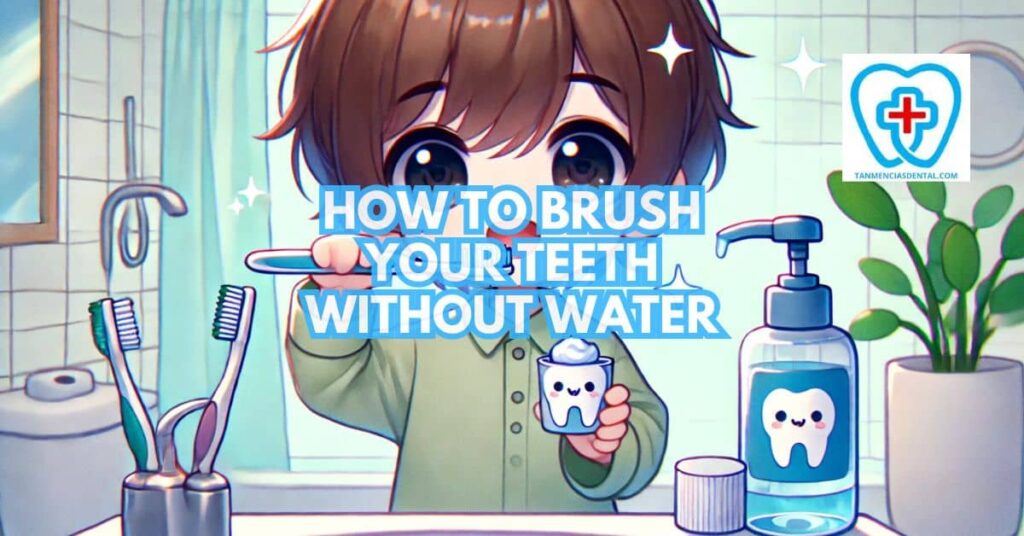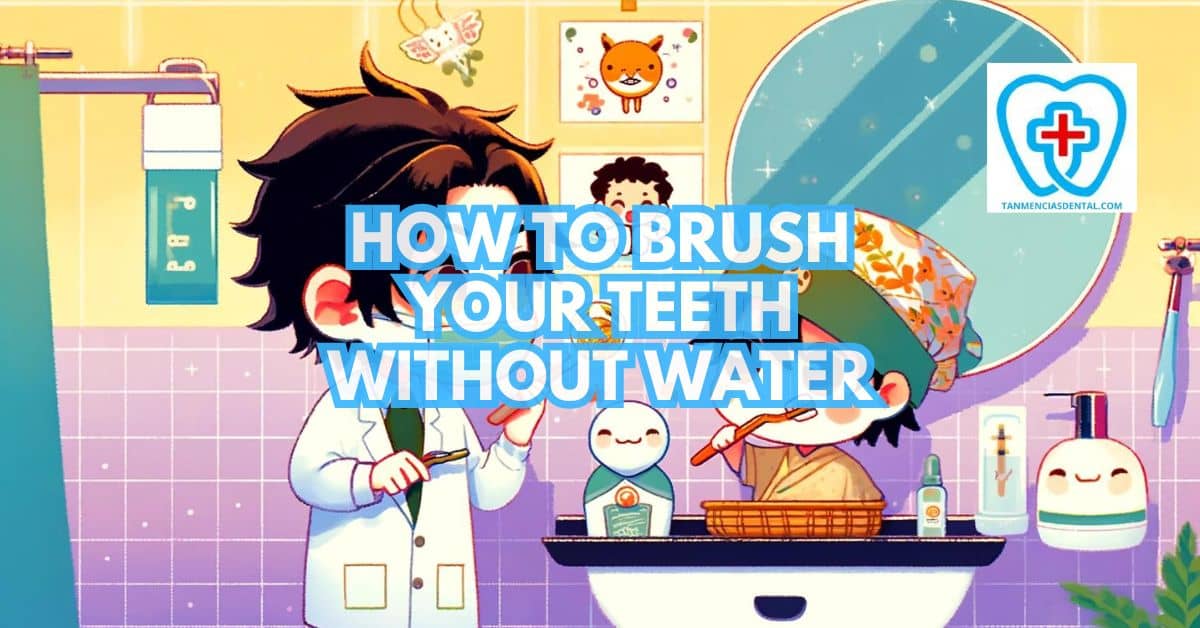Maintaining fresh breath and a clean mouth is important, even when water isn’t available.
Whether you’re camping, traveling, or facing an emergency, knowing how to brush your teeth without water can be very helpful.
Waterless dental care techniques can keep your teeth and gums healthy when traditional methods aren’t an option.
These tips will show you safe and effective ways to maintain oral hygiene without relying on water.
Read on to learn simple techniques for staying fresh anytime, anywhere.
1. Brushing Without Water: When It’s Okay in a Pinch
Brushing without water can be useful in situations where water is unavailable, like long flights, camping trips, or unexpected water outages.
In these moments, you might not be able to wet your toothbrush as usual, but there are still ways to clean your teeth and maintain a fresh mouth.
Instead of water, you can try brushing gently with a dry toothbrush to remove plaque and food particles.
The bristles on your brush can still help scrub away bacteria from your teeth, even if they’re not wet.
However, this method may not be as effective as traditional brushing because water helps spread the toothpaste and soften the bristles, which makes cleaning more thorough.
Remember to brush softly, as dry bristles can be harsher on your gums and tooth enamel.
This technique should be used occasionally, just to manage plaque and freshness until you can brush your teeth with water again.
🦷 Uncover Effective Mouthwash Solutions for Tartar: Your Guide to Optimal Dental Care
2. Dry Brushing with Toothpaste: Making the Most of It
Dry brushing with toothpaste is a handy way to clean teeth when you don’t have access to water.
Start by putting a pea-sized amount of toothpaste on your toothbrush and brushing as you usually would, making sure to cover each tooth surface.
Pay special attention to the gum line, where plaque often builds up, as brushing this area can help prevent bacteria from gathering.
Since you can’t rinse, spit out the toothpaste completely to avoid leaving any residue in your mouth.
Although brushing teeth without water isn’t as effective as rinsing with water, it can reduce plaque and help your mouth feel cleaner.
Take care to use gentle, circular motions to protect your gums and avoid pressing too hard with the dry bristles.
This approach should only be used occasionally, as regular brushing with water is important for thorough cleaning and oral health.
🦷 Maintain Your Oral Health with Professional Teeth Cleaning Services in Marikina
3. Natural Alternatives to Toothpaste
If you don’t have toothpaste, there are a few natural alternatives that can help you clean your teeth effectively.
Baking soda, for example, is a great choice because its mildly abrasive texture helps remove plaque and surface stains.
You can also try salt, which has natural antibacterial properties to fight germs in your mouth; just sprinkle a little on your toothbrush or rub it gently along your teeth.
Coconut oil pulling is another option—swish a small amount of coconut oil around your mouth for about 10-15 minutes to help remove toxins and bacteria.
After using any of these alternatives, it’s essential to floss to remove any food particles left between your teeth.
Following up with a rinse is also helpful; if you can, use water to rinse your mouth thoroughly to wash away any residue from the natural cleaner.
These methods can serve as useful backups when toothpaste isn’t available, though regular toothpaste and brushing remain the best choices for daily use.
Always be gentle with natural ingredients to avoid irritating your gums.
🦷 The Essential Role of Dental Associates in Comprehensive Modern Dentistry
4. Brushing Technique: No Water, No Problem (Well, Sort Of)
Effective brushing technique is crucial, especially when no water is involved.
Begin with the outer surfaces of your teeth using gentle circular motions, which help dislodge food particles and plaque without the aid of water.
Proceed to brush the inner surfaces of your teeth, ensuring you reach the back molars, where bacteria often accumulate.
It’s important to brush the biting surfaces of your teeth as well, especially to remove food residues.
Since rinsing is not an option, make sure to spit out any buildup of toothpaste and debris after you’re done.
🦷 Is Gingivitis Life-Threatening? Exploring the Serious Risks of Ignoring Gum Health

5. Fluoride and Rinsing: A Balancing Act
Using fluoride toothpaste when brushing without water helps strengthen the enamel and reduce the risk of tooth decay.
Since rinsing with water isn’t an option, it’s critical to only use a small amount of toothpaste and spit out the residue thoroughly after brushing.
The fluoride from the toothpaste continues to protect your teeth even without rinsing, but excess fluoride should not be swallowed.
This balance is key to maximizing the benefits of fluoride while minimizing any potential risks.
Always choose a toothpaste with an appropriate level of fluoride based on your specific dental needs.
🦷 Can a Gum Infection Be Fatal? Understanding the Dangers of Neglected Oral Hygiene
6. Temporary Freshness Hacks: A Breath of Relief
When water isn’t available, maintaining fresh breath can be a challenge.
Chewing sugar-free gum stimulates saliva production, which naturally cleanses the mouth and reduces bacteria responsible for bad breath.
Breath sprays or mints that do not require rinsing are another quick solution to improve oral freshness temporarily.
These products are especially useful in situations where brushing isn’t feasible, such as meetings or social gatherings.
However, they should not replace brushing but can be used to enhance oral hygiene temporarily.
🦷 Emergency Dental Care in Marikina: Fast Solutions for Quick Toothache Relief
7. Dental Hygiene Wipes: An Optional On-the-Go Tool (Use with Caution)
Dental hygiene wipes can be a handy addition to your travel hygiene kit, especially when water is scarce.
These wipes are impregnated with xylitol and other ingredients that can help reduce plaque and freshen breath.
They are particularly useful for cleaning the surfaces of the teeth quickly and can be disposed of after use.
However, they should be used cautiously, as they are not a replacement for brushing and can sometimes miss areas that a toothbrush can reach.
Always use these wipes according to the instructions, and do not rely on them as your sole oral hygiene method.
🦷 Top Foods for Stronger Teeth: How Your Diet Impacts Oral Health
8. Be Prepared: Travel-Sized Supplies for the Rescue
It’s wise to always have a travel-sized dental kit prepared, especially for those who frequently find themselves without access to clean water.
This kit should include a small tube of fluoride toothpaste, a compact toothbrush, and, if you use them, a pack of dental hygiene wipes.
Such kits are not only convenient but also ensure that you remain prepared to maintain dental hygiene under any circumstances.
Packing these items can save you from dental discomfort and prevent the buildup of bacteria when you are traveling.
Regularly check and replenish your kit to keep it ready for use at all times.
🦷 Unlocking the Secrets to Whiter Teeth After Braces: Achieve Your Perfect Smile!
9. Don’t Forget the Real Deal: Following Up Properly
Once you have access to water again, it is essential to brush your teeth the traditional way with water and fluoride toothpaste.
This ensures that any remaining debris or toothpaste residue is fully rinsed away.
Regular brushing with water is critical for removing plaque effectively and preventing gum disease.
Treat any period of brushing without water as a temporary measure and follow up with thorough cleaning as soon as possible.
Consistent follow-up with proper brushing techniques will safeguard your dental health over the long term.
🦷 The Advantages of Gargling Saltwater for Oral Health: A Simple Natural Remedy
10. Not a Long-Term Solution: Brushing Without Water Has Limits
Brushing without water should not be considered a long-term alternative to traditional brushing methods.
While it can be useful in emergency situations or during short periods without water access, it does not thoroughly remove plaque and bacteria as effectively as brushing with water.
Over time, skipping the rinsing step can lead to increased risks of dental decay and gum problems.
It’s important to resume regular brushing habits as soon as the situation allows.
Relying on waterless brushing for extended periods of time can compromise your oral health.
🦷 Combating Gingivitis with Baking Soda: A Natural and Effective Solution
11. Consult Your Dentist: Brushing Without Water Shouldn’t Be the Norm
If you find yourself frequently needing to brush without water, it’s important to discuss this with your dentist.
Your dentist can provide advice tailored to your specific dental health needs and circumstances.
They may also suggest more effective strategies for maintaining oral hygiene without regular access to water.
Regular checkups ensure that any potential problems caused by unusual brushing habits are identified and addressed early.
Always seek professional guidance to ensure that your dental care routine is appropriate and effective.
🦷 Tan-Mencias Dental Clinic Marikina
👨⚕️ Conclusion
While knowing how to brush your teeth without water can be beneficial in certain circumstances, it is crucial to prioritize traditional dental care practices whenever possible.
Regular brushing with water, using fluoride toothpaste, and following proper dental care routines are essential for maintaining oral health.
These waterless brushing methods should be viewed only as temporary solutions in unusual situations.
Always aim to return to normal hygiene practices to ensure the best care for your teeth and gums.
😊 Self-Promotion
Visit us at Tan-Mencias Dental Clinic in Parang, Marikina City, where your smile and dental health are our top priorities!
Our friendly team is dedicated to providing you with the personalized, gentle care that you deserve.
If you have any questions or would like to schedule an appointment, feel free to call us at 9171451074.
You can also reach out through our Facebook page or send a message via the contact form on our website.
We look forward to helping you achieve and maintain a bright, healthy smile!

